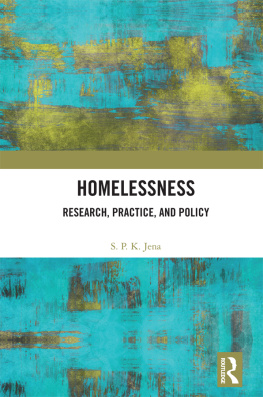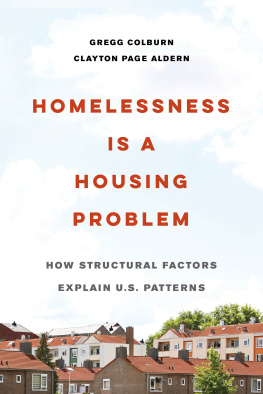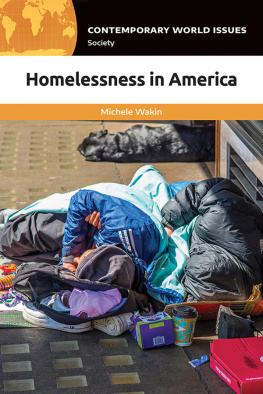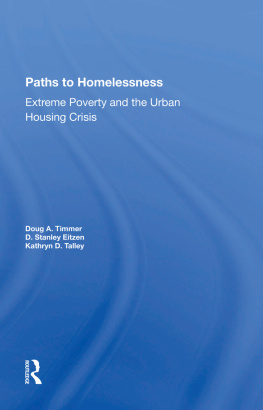Mean Streets
GEOGRAPHIES OF JUSTICE AND SOCIAL TRANSFORMATION
SERIES EDITORS
Mathew Coleman, Ohio State University
Sapana Doshi, University of Arizona
FOUNDING EDITOR
Nik Heynen, University of Georgia
ADVISORY BOARD
Deborah Cowen, University of Toronto
Zeynep Gambetti, Boazii University
Geoff Mann, Simon Fraser University
James McCarthy, Clark University
Beverley Mullings, Queens University
Harvey Neo, National University of Singapore
Geraldine Pratt, University of British Columbia
Ananya Roy, University of California, Los Angeles
Michael Watts, University of California, Berkeley
Ruth Wilson Gilmore, CUNY Graduate Center
Jamie Winders, Syracuse University
Melissa W. Wright, Pennsylvania State University
Brenda S. A. Yeoh, National University of Singapore
Mean Streets
HOMELESSNESS, PUBLIC SPACE, AND THE LIMITS OF CAPITAL
DON MITCHELL

2020 by the University of Georgia Press
Athens, Georgia 30602
www.ugapress.org
All rights reserved
Set in 10/12.5 Minion 3 by Kaelin Chappell Broaddus
Most University of Georgia Press titles are available from popular e-book vendors.
Printed digitally
Library of Congress Cataloging-in-Publication
Data Names: Mitchell, Don, 1961- author.
Title: Mean streets : homelessness, public space, and the limits of capital / Don Mitchell.
Description: Athens : The University of Georgia Press, [2020] | Series: Geographies of justice and social transformation; 47 | Includes bibliographical references and index.
Identifiers: LCCN 2019032948 | ISBN 9780820356891 (hardback) | ISBN 9780820356907 (paperback) | ISBN 9780820356914 (ebook)
Subjects: LCSH: HomelessnessUnited States. | Public spacesUnited States. | Urban policyUnited States.
Classification: LCC HV4505 .M58 2020 | DDC 362.5/920973dc23
LC record available at https://lccn.loc.gov/2019032948
CONTENTS
PREFACE
Mean Streets is the culmination of thirty years of researching and thinking about homelessness and public space in the American city. It brings together as a single, sustained argument a theory of the social and economic logic behind the historical development, evolution, and especially persistence of homelessness in the contemporary cityand how that persistence is fundamentally related to the way capital works in the urban built environment, and thus to the structure, function, meaning, use, and governance of urban public space. Yet while I argue that the problem of homelessness is at the root of many cities ongoing efforts at public space management, these efforts, and especially their effects, extend well beyond the lives of homeless people (as important as those lives are in and of themselves). In a word, the problem of homelessness in the American city is the problem of the American city: what it is, who it is for, what it does, and why it matters. And the problem of the American city is epitomized in public space.
A generation of research has shown that the publicness in public space is hardly self-evident. But digging into that question is not the point of this book.
This is why public space is a problem for capitalism even as it is a necessity. For neither capitalism (again as a fully social system) nor the demands of capital circulation and accumulation can ever fully determine public spaces production, use, or meaning. These are always struggled over. Indeed, what public space is, and what it becomes, is, as I argue throughout Mean Streets, both a result and an essential ingredient in class struggle within capitalism. That struggle and the spaces and practices that result in turn structure just what capitalism isand what the patterns of capital circulation and accumulation in the built environment, as well as the modes of sociability possible, not only are, but can be. The problem of public space is thus a problem of the limits to capital: the limits of what it is possible for capital to do, socially and economically, as well as the limits to what capitalism can be as a system that organizes our social reproduction and whatever well-being (or not) that may entail. Quite obviously, capitalists want and need to shape public space in their own interests (to support smooth accumulation of more capital, to allow for the easy circulation of goods, to promote consumption so that the value in all that is produced can be realized and returned back to their hands, and sometimes just to provide space for their own pleasure, because they too must be social, somehow), but they do not always get their way. Public space is a class struggle. And in this struggle, while the capitalist class may not always get what it needs or wants, it must, broadly, get quite a lot of it, if capitalism is to not reach its limit.
To determine is to set limits and exert pressures (see the first footnote), and
But what does it mean to say that homelessness is class struggle? homes, tiny studios and bedsits, or luxury condos in towering skyscrapers. These deeper structural processes are (at the risk of repetition but also to foreshadow a main argument of the book) the dynamics of capital circulation and accumulation that require impoverishment of a significant, and growing, number of people in order to function at all, and an ever growing number of impoverished people to function well. And finally, given that homeless people form a class, defined not by their attributes but by their structural position in society, and that this structural position is determined by and necessary to the circulation and accumulation of capital, homelessness is class struggle not only because people indeed fight over what it is and what it means, but especially because the capitalist class (and its advocates) knows exactly what would be at stake if homelessness were to be abolished: its own successful reproduction as a class.
These are strong claims, but I think the pages that follow bear them out. Even so, it is probably worth making as clear as possible what these pages do and do not do. They do not focus on homeless people Mean Streets is not a book about the homelessthough they do show to some degree what it means to survive right at the limits of capital. I do not focus on homeless people both because there already exist plenty of excellent ethnographic accounts of homeless people by scholars far better at undertaking such work than I could ever be, and because my point is precisely to show homelessness is a structural condition of capitalist society. This is important politically.
If we constantly define homelessness as a set of individual attributes (usually such things as mental illness and substance abuse problems, sometimes such things as poor education or vulnerability toor being victims ofabuse, every once in a while to the status of not having a permanent place to live), we might be able to intervene in peoples lives, which of course can be vitally important, but we will never be able to address the fact of homelessness in capitalism, much less its actual causes. We will never be able to create a politics adequate to the task of winning the class war that is homelessness. So this is not a book about the homelessyou will find precious little here about the lives of homeless people (though you will find much too much about their deaths, for the class war of homelessness is a deadly war)and it is not (directly) a book about homelessness as a housing question (though you will find plenty on how the dynamics of housing is deeply entwined with the production of homelessness through capital circulation and accumulation).








